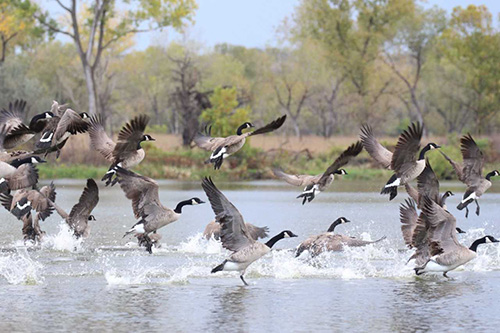Assessment of Resident Canada Goose Management in Kansas
Investigators:
John Boomer Malanchuk,
Ph.D. student
Project Supervisor:
Dr. David Haukos
Funding:
Kansas Department of Wildlife, Parks and Tourism
Cooperators:
Tom Bidrowski & Rich Schultheis
Kansas Department of Wildlife, Parks and Tourism
Kansas State University
Location:
Kansas
Completion:
2021
Status: Began 2017 (ongoing)
Objectives:
Determine the most economical and effective survey method to estimate temperate-breeding Canada goose population abundance and distribution in Kansas
Estimate vital rates for temperate-breeding Canada geese in Kansas.
Assess which management action(s) have the greatest effect on temperate-breeding Canada goose demography in Kansas
Progress and Results:
As resident Canada goose (Branta canadensis) populations have increased so has the need to improve biological data to support management decisions. Information on population size, distribution, population potential, survival, movement and nuisance abatement are essential. Although abundance anddensities of resident Canada geese in Kansas have remained below national trends, their number and perceived/realized effects gamerconsiderable management and resources. Asa result, Kansas Department of Wildlife, Parks, and Tourism (KDWPT) has used a variety of management strategies including expanded hunting opportimities, nuisance goose relocations, and nest/egg destruction to sustain abundance at socially accepted levels.
Current and future management of resident Canada geese requires accurate measures of resident goose abundance and distribution. Prior to 1996, attempts to gamer information on resident Canada goose dynamics in Kansas were through anecdotal information and periodic and localized studies. From 1996 to 2010, the population status of resident Canada geese in Kansas was obtained by KDWPT through ground-survey routes conducted late March and early April. In April 2011 KDWPT transitioned fix>m the trend-based roadside counts to an aerial plot survey where credible population estimates could be derived. Now, a stratified, random plot, aerial survey is annually conducted to gather information onresident Canada geese abundance and distribution in Kansas. Stratification is based on habitat metrics and land use patterns for each unit of the Public Land Survey System of Kansas. Surveys are conducted during the month of April to coincide with peak nesting for resident Canada geese in Kansas. Estimates are derived for indicated breeding pairs and total geese for each stratum as well as statewide. In the initial year,surveystratification wascompleted at the county level based on KDWPT field staff professional opinion of the goose density (high, medium and low). Each subsequent year, elements were incorporated to refine stratification. These elements have reduced confidence intervals; however, confidence intervals around the population estimate still remain greater than the desired 15%. Efforts are needed to better define stratifications, select optimal allocation of plots for each stratum and standardize survey protocols. With the advent of an operational banding program in 2012 in Kansas, comparisons cannow be conducted to explore if accurate population estimates from band returns could provide the similaror improved precisions at lower costs than current population estimate methods.